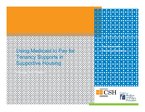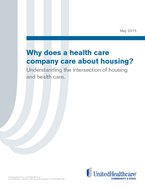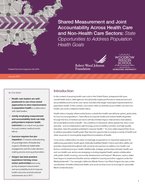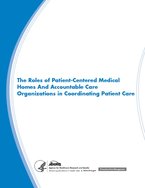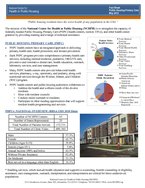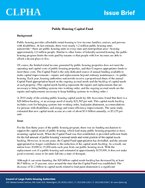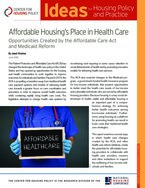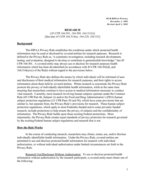0
Policy Brief
Community:
Nov 1, 2018
Colleges and higher education systems can make institutional policy changes to bolster the success of students who are parents and their families through intentional use of a two-generation approach. This brief focuses on traditional two-year and four-year baccalaureate pathways for students who are parents; it complements a brief released on policy solutions.
Authored by: Ascend: The Aspen Institute
Topics: Dual-generation, Education, Low-income, Partnerships, Post-secondary, Youth
 Shared by Mica O'Brien
Shared by Mica O'Brien
Mica O'Brien posted a
on Nov 1, 2018
Ascend: The Aspen Institute
Colleges and higher education systems can make institutional policy changes to bolster the success of students who are parents and their families through intentional use of a two-generation approach.
0
Policy Brief
Community:
Nov 1, 2018
There are opportunities for federal and state policies to better support postsecondary institutions in serving students who are parents and their families. Policymakers can incentivize partnerships, name students who are parents as special or target populations, and facilitate financial aid processes that address the needs of families. Where possible, policies can also encourage creative and innovative approaches to leveraging existing programs to facilitate access and successful completion for parenting students. These recommendations seek to promote policy changes that address the critical supports students raising children and their families need for successful completion: affordable and quality child care, financial aid, wraparound services, and workforce readiness.
Authored by: Ascend: The Aspen Institute
Topics: Dual-generation, Education, Legislation & Policy, Partnerships, Post-secondary, Research, Workforce development, Youth
 Shared by Mica O'Brien
Shared by Mica O'Brien
Mica O'Brien posted a
on Nov 1, 2018
Ascend: The Aspen Institute
There are opportunities for federal and state policies to better support postsecondary institutions in serving students who are parents and their families.
0
Policy Brief
Community:
It’s no secret that survivors of domestic and sexual violence make up a large percentage of the families and individuals who seek help from the homeless/housing services system. No one expects homeless/housing programs to become an extension of the victim services system. But the intersection between homelessness and domestic and sexual violence requires both systems to do their work with that reality in mind.
Authored by: National Alliance for Safe Housing
Topics: Child welfare, Domestic violence, Homelessness, Housing, Legislation & Policy, Partnerships, Safety
 Shared by Mica O'Brien
Shared by Mica O'Brien
Mica O'Brien posted a
on Nov 1, 2018
National Alliance for Safe Housing
It’s no secret that survivors of domestic and sexual violence make up a large percentage of the families and individuals who seek help from the homeless/housing services system. No one expects homeless/housing programs to become an extension of the victim services system.
0
Policy Brief
Community:
Oct 29, 2018
In this Focus on Unaccompanied Youth brief, we review data and information that help us answer the following
questions:
• What is the scale of youth homelessness?
• What do we know about unaccompanied youth who experience homelessness?
• What do we know about patterns of homelessness among unaccompanied youth?
• What do we know about youths’ risks for experiencing homelessness?
• What are the most significant gaps in available data and our current understanding of unaccompanied
youth who experience homelessness?
Authored by: U.S. Interagency Council on Homelessness
Topics: Data sharing, Homelessness, Housing, Low-income, Metrics, Research, Youth
 Shared by Mica O'Brien
Shared by Mica O'Brien
Mica O'Brien posted a
on Nov 1, 2018
U.S. Interagency Council on Homelessness
In this Focus on Unaccompanied Youth brief, we review data and information that help us answer the following
questions:
• What is the scale of youth homelessness?
• What do we know about unaccompanied youth who experience homelessness?
• What do we know about patterns of homelessness among unacc
0
Policy Brief
Community:
Oct 24, 2018
On Wednesday, October 24, President Trump signed into law bipartisan legislation, H.R. 6, the SUPPORT for Patients and Communities Act. This sweeping legislation contains many provisions that could help children, youth, and families experiencing homelessness who are impacted by the opioid crisis, as well as provisions to help all children and youth who experience trauma.
Authored by: SchoolHouse Connection
Topics: Child welfare, Dual-generation, Early childhood, Family engagement, Housing, Legislation & Policy, Low-income, Substance abuse, Supportive housing
 Shared by Mica O'Brien
Shared by Mica O'Brien
Mica O'Brien posted a
on Oct 31, 2018
On Wednesday, October 24, President Trump signed into law bipartisan legislation, H.R. 6, the SUPPORT for Patients and Communities Act.
0
Policy Brief
Community:
Oct 9, 2018
This brief highlights evidence on nutrition supports for families with young children and proposes a policy-focused research agenda designed to address knowledge gaps in two areas: (1) understanding disparities in participation in nutrition supports and (2) assessing strategies to increase access to nutrition supports and reduce nutrition disparities.
Authored by: Mathematica
Topics: Child welfare, Dual-generation, Early childhood, Food insecurity, Low-income, Nutrition, Research
 Shared by Mica O'Brien
Shared by Mica O'Brien
Mica O'Brien posted a
on Oct 22, 2018
This brief highlights evidence on nutrition supports for families with young children and proposes a policy-focused research agenda designed to address knowledge gaps in two areas: (1) understanding disparities in participation in nutrition supports and (2) assessing strategies to increase access to
0
Policy Brief
Community:
Oct 9, 2018
This brief highlights evidence on income support policies, and associated work requirements, for families with young children and proposes a policy-focused research agenda designed to address knowledge gaps in two areas: (1) understanding disparities in participation in income supports and (2) assessing innovative strategies to reduce disparities in income supports.
Authored by: Mathematica
Topics: Legislation & Policy, Low-income, Research, Workforce development
 Shared by Mica O'Brien
Shared by Mica O'Brien
Mica O'Brien posted a
on Oct 22, 2018
This brief highlights evidence on income support policies, and associated work requirements, for families with young children and proposes a policy-focused research agenda designed to address knowledge gaps in two areas: (1) understanding disparities in participation in income supports and (2) asses
0
Policy Brief
Community:
Oct 9, 2018
This brief highlights evidence about early care and education (ECE) access and presents a policy-focused research agenda designed to fill knowledge gaps in three areas: (1) documenting disparities in access to and participation in ECE, (2) identifying and assessing innovations to reduce disparities, and (3) identifying and testing strategies to scale up effective ECE programs.
Authored by: Mathematica
Topics: Early childhood, Education, Legislation & Policy, Low-income, Research, School-readiness
 Shared by Mica O'Brien
Shared by Mica O'Brien
Mica O'Brien posted a
on Oct 22, 2018
This brief highlights evidence about early care and education (ECE) access and presents a policy-focused research agenda designed to fill knowledge gaps in three areas: (1) documenting disparities in access to and participation in ECE, (2) identifying and assessing innovations to reduce disparities,
0
Policy Brief
Community:
Oct 9, 2018
Research shows that the earliest years of life are a critical period of human development. Young children’s earliest relationships and experiences have a strong influence on brain development and future health and well-being. Young children’s foundational relationships and experiences occur in the context of families and communities. Yet, low-income families—especially families of color and rural families—often do not have access to the basic necessities and resources to foster the nurturing experiences and stimulating environments that young children need to thrive. What is needed are policies that support low-income families to provide stimulating and nurturing environments to promote children’s healthy physical, socialemotional, and cognitive development and their future success in school and life.
Authored by: Mathematica
Topics: Child welfare, Dual-generation, Early childhood, Low-income, Research
 Shared by Mica O'Brien
Shared by Mica O'Brien
Mica O'Brien posted a
on Oct 22, 2018
Research shows that the earliest years of life are a critical period of human development. Young children’s earliest relationships and experiences have a strong influence on brain development and future health and well-being.
0
Policy Brief
Community:
Oct 1, 2018
Authored by: SchoolHouse Connection
Topics: Child welfare, Early childhood, Education, Health, Homelessness, Low-income, Pre-natal
 Shared by Mica O'Brien
Shared by Mica O'Brien
Mica O'Brien posted a
on Oct 10, 2018
0
Policy Brief
Community:
This short document provides basic information to help housing and homeless assistance providers advocate with their families and youth for appropriate educational services, from birth through higher education. The rights and protections outlined here apply to all children and youth experiencing homelessness, as defined by the education subtitle of the McKinney-Vento Act.
Authored by: SchoolHouse Connection
Topics: Disabilities, Dual-generation, Early childhood, Education, Family engagement, Homelessness, Housing, Legislation & Policy, Low-income, Post-secondary, Youth
 Shared by Mica O'Brien
Shared by Mica O'Brien
Mica O'Brien posted a
on Oct 10, 2018
This short document provides basic information to help housing and homeless assistance providers advocate with their families and youth for appropriate educational services, from birth through higher education.
0
Policy Brief
Community:
Aug 9, 2018
Partnerships between medicaid and supportive housing providers
Authored by:
Topics: Cost effectiveness, Funding, Health, Legislation & Policy, Low-income, Medicaid / Medicare, Partnerships, Supportive housing
 Shared by Housing Is
Shared by Housing Is
Housing Is posted a
on Aug 9, 2018
Partnerships between medicaid and supportive housing providers
0
Policy Brief
Community:
Aug 9, 2018
In a post health care reform era, Medicaid programs need to build system capacity to effectively manage increasingly complex Medicaid populations while simultaneously seeking innovative solutions to reduce costs and improve access. As states are increasingly becoming more reliant upon managed care for complex populations – such as individuals in need of long-term services and supports, those with intellectual or developmental disabilities, individuals with severe and persistent mental illness, as well as children with special health care needs – the needs of these populations range far beyond traditional health care.
Authored by:
Topics: Funding, Health, Housing, Low-income, Medicaid / Medicare, Partnerships
 Shared by Housing Is
Shared by Housing Is
Housing Is posted a
on Aug 9, 2018
In a post health care reform era, Medicaid programs need to build system capacity to effectively manage increasingly complex Medicaid populations while simultaneously seeking innovative solutions to reduce costs and improve access.
0
Policy Brief
Community:
Aug 9, 2018
Everyone needs safe, decent, stable housing. For some of the most vulnerable people in America — people with mental illness, chronic health conditions, histories of trauma, and other struggles — a home helps them to get adequate treatment and start on the path toward recovery. But some conditions make it difficult for people to maintain a stable home without additional help. Supportive housing, a highly effective strategy that combines affordable housing with intensive coordinated services, can provide that needed assistance.
Authored by:
Topics: Cost effectiveness, Disabilities, Health, Homelessness, Housing, Low-income, Medicaid / Medicare, Mental health, Place-based, Seniors, Supportive housing
 Shared by Housing Is
Shared by Housing Is
Housing Is posted a
on Aug 9, 2018
Everyone needs safe, decent, stable housing. For some of the most vulnerable people in America — people with mental illness, chronic health conditions, histories of trauma, and other struggles — a home helps them to get adequate treatment and start on the path toward recovery.
0
Policy Brief
Community:
Aug 9, 2018
Social determinants of health are the economic and social conditions that affect health outcomes and are the underlying, contributing factors of health inequities. Examples include housing, educational attainment, employment and the environment.
Authored by:
Topics: Affordable Care Act, Disabilities, Health, Homelessness, Housing, Low-income, Medicaid / Medicare, Mental health, Partnerships, Place-based, Substance abuse, Supportive housing
 Shared by Housing Is
Shared by Housing Is
Housing Is posted a
on Aug 9, 2018
Social determinants of health are the economic and social conditions that affect health outcomes and are the underlying, contributing factors of health inequities. Examples include housing, educational attainment, employment and the environment.
0
Policy Brief
Community:
Aug 9, 2018
This brief outlines how state agencies can employ shared measurement and joint accountability across sectors as tools for improving population health outcomes. States can use these tools to drive coordination of preventive efforts and broaden the boundaries of population health achievements that no sector, or isolated incentive, can achieve alone.
Authored by:
Topics: Child welfare, Data sharing, Education, Family engagement, Health, Housing, Low-income, Metrics
 Shared by Housing Is
Shared by Housing Is
Housing Is posted a
on Aug 9, 2018
This brief outlines how state agencies can employ shared measurement and joint accountability across sectors as tools for improving population health outcomes.
0
Policy Brief
Community:
Aug 9, 2018
Federal rules on immigrant youth and families are changing rapidly, from Deferred Action for Childhood Arrivals (DACA) to Temporary Protected Status (TPS). This brief provides basic information about eligibility for education services, and practical suggestions for schools.
Authored by: ScoolHouse Connection
Topics: Child welfare, Education, Immigrants, Legislation & Policy
 Shared by Housing Is
Shared by Housing Is
Housing Is posted a
on Aug 9, 2018
Federal rules on immigrant youth and families are changing rapidly, from Deferred Action for Childhood Arrivals (DACA) to Temporary Protected Status (TPS). This brief provides basic information about eligibility for education services, and practical suggestions for schools.
0
Policy Brief
Community:
Aug 9, 2018
The Every Student Succeeds Act of 2015 (ESSA) amended the McKinney-Vento Act’s Education for Homeless Children and Youth program, as well as Title I, Part A of the Elementary and Secondary Education Act. The ESSA amendments include many provisions designed to improve training, identification, enrollment, stability, and
success, from pre-school through high school, and the transition to post-secondary education. A brief summary is provided.
Authored by: SchoolHouse Connection
Topics: Early childhood, Education, Homelessness, Legislation & Policy
 Shared by Housing Is
Shared by Housing Is
Housing Is posted a
on Aug 9, 2018
The Every Student Succeeds Act of 2015 (ESSA) amended the McKinney-Vento Act’s Education for Homeless Children and Youth program, as well as Title I, Part A of the Elementary and Secondary Education Act.
0
Policy Brief
Community:
Jul 27, 2018
The effective coordination of a patient’s health care services is a key component of high quality and efficient care. In this brief we first describe the goals of care coordination and the central role for primary care, followed by the specific activities involved in care coordination. Next we summarize the evidence on the effectiveness of different care coordination activities that PCMHs and ACOs can pursue. Finally, we suggest roles for PCMHs and ACOs in coordinating care and summarize key points.
Authored by:
Topics: Data sharing, Health, Partnerships, Preventative care
 Shared by Housing Is
Shared by Housing Is
Housing Is posted a
on Jul 27, 2018
The effective coordination of a patient’s health care services is a key component of high quality and efficient care. In this brief we first describe the goals of care coordination and the central role for primary care, followed by the specific activities involved in care coordination.
0
Policy Brief
Community:
Jul 23, 2018
Public Housing Primary Care (PHPC) health centers have an integrated approach to delivering primary health care, health promotion, and disease prevention. PHPC health centers work closely with public housing authorities to address the health and wellness needs of the diverse residents.
Authored by:
Topics: Funding, Health, Housing, Low-income, Mental health, Partnerships, Place-based
 Shared by Housing Is
Shared by Housing Is
Housing Is posted a
on Jul 23, 2018
Public Housing Primary Care (PHPC) health centers have an integrated approach to delivering primary health care, health promotion, and disease prevention. PHPC health centers work closely with public housing authorities to address the health and wellness needs of the diverse residents.
0
Policy Brief
Community:
Jul 20, 2018
Of course, the limited rental income generated by public housing properties does not meet the operating and capital costs of public housing properties, and thus Congress appropriates funds to meet these costs. The Capital Fund is the only dedicated source of annual funding available to make capital improvements—repairs and replacements beyond ordinary maintenance—to public housing. Each year, housing authorities nationwide receive a proportional share of the annual Capital Fund appropriation based on the ongoing accrual needs and the backlog of capital needs at each property
Authored by:
Topics: CLPHA, Funding, Legislation & Policy
 Shared by Housing Is
Shared by Housing Is
Housing Is posted a
on Jul 20, 2018
Of course, the limited rental income generated by public housing properties does not meet the operating and capital costs of public housing properties, and thus Congress appropriates funds to meet these costs.
0
Policy Brief
Community:
Jul 20, 2018
This report examines several ways in which health care changes created by the ACA, and other health care reform initiatives, create the potential for affordable housing providers to collaborate with health care providers, insurers, and other institutions to support the wellbeing of low-income individuals and families.
Authored by:
Topics: Affordable Care Act, Health, Homelessness, Housing, Legislation & Policy, Low-income, Medicaid / Medicare, Partnerships
 Shared by Housing Is
Shared by Housing Is
Housing Is posted a
on Jul 20, 2018
This report examines several ways in which health care changes created by the ACA, and other health care reform initiatives, create the potential for affordable housing providers to collaborate with health care providers, insurers, and other institutions to support the wellbeing of low-income indiv
0
Policy Brief
Community:
Jul 19, 2018
The HIPAA Privacy Rule establishes the conditions under which protected health information may be used or disclosed by covered entities for research purposes.
Authored by:
Topics: Data sharing, Health, Research
 Shared by Housing Is
Shared by Housing Is
Housing Is posted a
on Jul 19, 2018
The HIPAA Privacy Rule establishes the conditions under which protected health information may be used or disclosed by covered entities for research purposes.
0
Policy Brief
Community:
Jul 19, 2018
This policy brief examines how the physical inspection process can promote healthy affordable housing. A review of housing quality issues linked to health and the role of physical inspections to improve health is provided.
Authored by:
Topics: Asthma, Child welfare, Health, Housing, Lead, Legislation & Policy, Low-income, Preventative care, Safety
 Shared by Housing Is
Shared by Housing Is
Housing Is posted a
on Jul 19, 2018
This policy brief examines how the physical inspection process can promote healthy affordable housing. A review of housing quality issues linked to health and the role of physical inspections to improve health is provided.
0
Policy Brief
Community:
Jul 19, 2018
While links between housing deficiencies and health conditions are well substantiated, research evaluating the health benefits of specific interventions has been limited. There is, however, some evidence that multifaceted interventions may lead to improvements in health of children and families, as well as to reduced use of medical services.
Authored by:
Topics: Community development, Funding, Health, Healthy homes, Medicaid / Medicare, Seniors
 Shared by Housing Is
Shared by Housing Is
Housing Is posted a
on Jul 19, 2018
While links between housing deficiencies and health conditions are well substantiated, research evaluating the health benefits of specific interventions has been limited.


 Shared by Housing Is
on Aug 9, 2018
Shared by Housing Is
on Aug 9, 2018
 Shared by Housing Is
on Aug 9, 2018
Shared by Housing Is
on Aug 9, 2018
 Shared by Housing Is
on Aug 9, 2018
Shared by Housing Is
on Aug 9, 2018
 Shared by Housing Is
on Aug 9, 2018
Shared by Housing Is
on Aug 9, 2018
 Shared by Housing Is
on Aug 9, 2018
Shared by Housing Is
on Aug 9, 2018
 Shared by Housing Is
on Aug 9, 2018
Shared by Housing Is
on Aug 9, 2018
 Shared by Housing Is
on Aug 9, 2018
Shared by Housing Is
on Aug 9, 2018
 Shared by Housing Is
on Jul 27, 2018
Shared by Housing Is
on Jul 27, 2018
 Shared by Housing Is
on Jul 23, 2018
Shared by Housing Is
on Jul 23, 2018
 Shared by Housing Is
on Jul 20, 2018
Shared by Housing Is
on Jul 20, 2018
 Shared by Housing Is
on Jul 20, 2018
Shared by Housing Is
on Jul 20, 2018
 Shared by Housing Is
on Jul 19, 2018
Shared by Housing Is
on Jul 19, 2018
 Shared by Housing Is
on Jul 19, 2018
Shared by Housing Is
on Jul 19, 2018
 Shared by Housing Is
on Jul 19, 2018
Shared by Housing Is
on Jul 19, 2018




